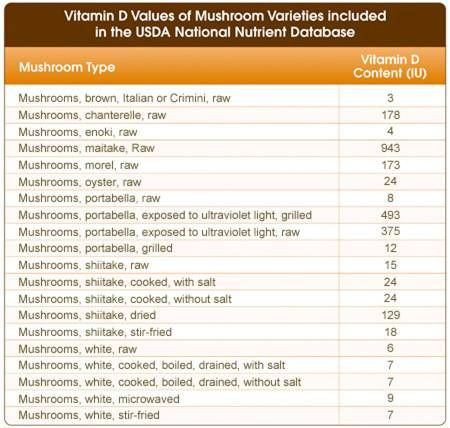Mushrooms Just As Good As Vitamin D Supplements

You may have heard that calcium is the key mineral for keeping bones and muscles strong, but without enough vitamin D, all those calcium supplements and milk won’t help.
Vitamin D is essential to the absorption of calcium from your food to your bones, which is one reason that it is added to milk. Maintaining an adequate amount of vitamin D helps reduce the risk of bone breaks, osteomalacia, osteoarthritis and osteoporosis.
Our bodies produce vitamin D naturally when we are in sunlight, but living in cold and cloudy areas and modern indoor lifestyles limit the amount of the vitamin we make, requiring many to turn to supplements. New research shows that eating some mushrooms may be just as good.
A study out of the Boston University School of Medicine compared eating mushrooms exposed to ultraviolet light to taking supplements of vitamin D2 or D3. Study participants ingested either the powered mushrooms or vitamin supplements once a day for 12 weeks during the winter, during which reseachers checked the blood levels of vitamin D metabolites.
By the end of the experiment all 30 study participants had comparable amounts of vitamin D byproducts in their bloodstream.
These results provide evidence that ingesting mushrooms which have been exposed to ultraviolet light and contain vitamin D2 are a good source of vitamin D that can improve the vitamin D status of healthy adults. Furthermore we found ingesting mushrooms containing vitamin D2 was as effective in raising and maintaining a healthy adult's vitamin D status as ingesting a supplement that contained either vitamin D2 or vitamin D3," said Dr. Michael F. Holick, PhD, MD, the principal investigator of the abstract who presented at the American Society for Biochemistry and Microbiology annual meeting.
"These results confirm other studies that have demonstrated that ingesting vitamin D2 either from fortified orange juice, a supplement or a pharmaceutical formulation were all capable of increasing total circulating 25(OH) D concentrations for at least 3 months, and up to 6 years," Holick added.
Another poster at the conference showed that mushrooms make vitamin D2 in the same way that humans do, with sunlight or ultraviolet light exposure.
Vitamin D can help fight off infections like the flu by strengthen the immune system and reduces the risk of many common diseases including cancer, cardiovascular disease, depression and diabetes.
The research will shortly be published in the journal Dermato-Endocrinology.



























